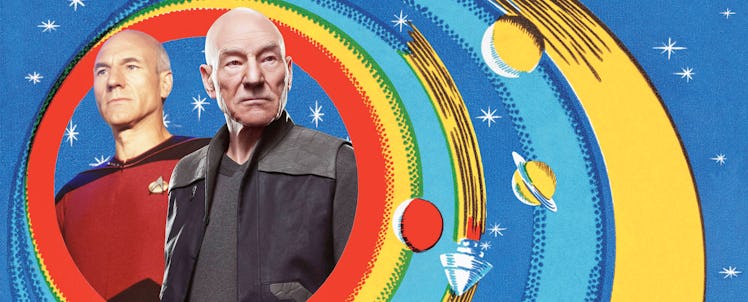Space Dad Makes Everything Okay
The dreams of the '90s are alive with 'Star Trek: Picard.'

In 2009, when Chris Pine punched his way through the J.J. Abrams-helmed Star Trek reboot, TV ad ran ads rendering explicit what we all knew: “This is not your parents Star Trek.” For me, this was only kind of true. My parents’ Star Trek was nominally the story of Captain Kirk, but because I grew up in the nineties and we watched Star Trek: The Next Generation as a family, I more strongly associated them with Patrick Stewart’s Captain Picard. Granted, Pine wasn’t Picard either. He was slap-happy and aggressive in a way that Picard, who took a more studied, diplomatic approach to interplanetary relations, never was.
Truth be told, I wasn’t looking for a James Bondian Federation captain like Kirk. As a kid, I preferred Picard. He was an admirable man. Now, in an age when those seem to be in short supply, it’s nice to have him back. With the debut of the new series Star Trek: Picard on CBS All-Access, nineties kids can visit with Space Dad again. And it feels good. He’s older now and maybe a little bit world(s) weary, but refreshingly real.
For the first half of the first episode of Picard, there’s certainly a “get-off-my-lawn” feeling to the way the titular character interfaces with contemporary society. He’s pissed that Starfleet banned androids. He’s pissed that he wasn’t allowed to go on a huge rescue mission for the Romulans. He’s even a little pissed that he has to wake up in the morning. The Jean-Luc Picard who opens this adventure isn’t a tragic drunk, sleeping off red wine hangovers in his family’s vineyard, but if you squint a certain way, he’s the same guy on the other side of a bad decade. He snaps at a TV reporter who doesn’t get his historical reference to the events of Dunkirk. Is this the tragic third act of all great adventurers?
No. Thankfully, the writing here is smarter than that. The showrunner for Star Trek: Picard is Michael Chabon, the author best known for The Amazing Adventures of Kavalier and Clay and, more recently, the man behind the memoir Pops: Fatherhood in Pieces. Recently, Chabon penned an essay for The New Yorker in which described his dying father’s love of Star Trek. He wrote in the ICU while also penning a script for a Short Treks episode about young Spock.
Chabon is a sentimentalist well suited to telling a story about Picard, who is the same. And Picard really takes off when it becomes about an old man and a young person exchanging guidance for purpose. Chabon also knows that sometimes those two distinctly different viewpoints live inside the same person. His novel Wonder Boys was quite similar — though it focused on a road trip between a pot-smoking English professor and a promising, unstable student. There are shades of this generational reckoning in Star Trek: Picard, because although there’s a big twist involving Jean-Luc’s new young friend — the mysterious Dahj (Isa Briones) — Picard still believes in the future. He believes we have to invest in young people, even if those people might be secret robots.
Space dad is still a good space dad. He’s the space dad we want — the one who isn’t too wizened or tired to care.
When motivated by the young person in his life (to say nothing of her secret twin sister), our roughly 79-year-old protagonist decides to get out of his funk. In short, Picard comes back with an attitude. “I haven’t been living,” he snarls at his pointed-eared Romulan housekeepers. “I’ve been waiting to die.” Picard doesn’t say “engage” or “make it so” in this first episode — don’t worry it’s going to happen — but that makes the series more compelling. It’s not a rehash. It’s a story about a character that a lot of people, including me and my parents, cared about.
And it handles aging responsibly. Years don’t tend to make us more likable or easier to get along with, but they also don’t transform us entirely. Picard is still Picard. The man’s values have not changed.
And the show has matured with its audience. The show’s great lesson for Picard fans who wore out The Next Generation in the nineties is this: Sometimes saving the galaxy doesn’t mean barking orders on the bridge of the Starship Enterprise. Sometimes it means getting out of bed in the morning and helping people. Do that without complaining constantly and you’re a hero for all time.
Star Trek: Picard is streaming now on CBS All-Access.
This article was originally published on